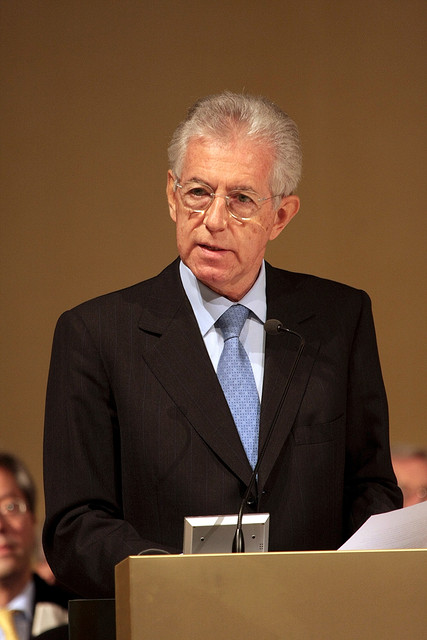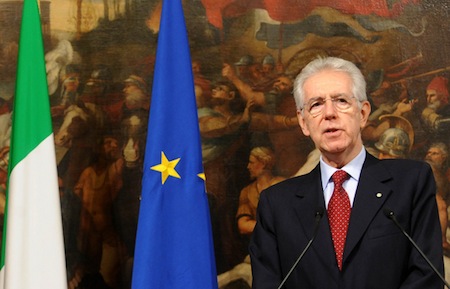One of the enduring questions of the Italian election has been whether outgoing prime minister Mario Monti will run or not.![]()
Given the popularity of his reforms with the European Union leadership generally and with international investors, his return as prime minister after the February elections is by far their top preference. Any indication that Italy will make a U-turn on its recent reforms could send Italian bond rates skyrocketing back to the 7%-and-climbing levels of November 2011.
Presumably, too, Monti would very much like to return for a longer term as prime minister to see through further reforms, further budget cuts, and be remembered as the ‘grown-up’ prime minister that put Italy on a long-term path for future growth.
But it’s an important question not just for Italy, but for all of Europe, and the U.S. economy as well.
Legally, of course, Monti cannot run for office in his own right because he’s a senator for life’ and thus, is unable run for a seat in Italy’s lower parliamentary house, the Camera dei Deputati (House of Deputies) — but that’s not really an answer as to whether he’s ‘running’ or not.
Over the weekend, Monti sort-of emerged as a candidate for the elections — he said he is ‘willing’ to lead a coalition of small centrist parties, each of which would vote to install Monti as prime minister for a second Monti-led government. He had harsh words for Silvio Berlusconi, who has returned, despite his massive unpopularity, to lead the conservative Popolo della Libertà (PdL, People of Freedom) by asserting over the weekend that Berlusconi has demonstrated a ‘certain volatility in judgment’ — an incredibly muted criticism, perhaps, but a criticism nonetheless. He continued his aggressive tone today with respect to Pier Luigi Bersani, who leads a center-left coalition that features the Partito Democratico (PD, Democratic Party), by urging Bersani to silence the extremists within his own alliance.
It’s an incredibly difficult tightrope walk for Monti, given that the polls show his coalition is set to finish no better than fourth, so the only way he can return as prime minister is through the election of a hung parliament.
Monti must at least provide a pro forma argument for supporting the ‘pro-Monti’ coalition, or he would risk minimizing the number of votes that will go to the ‘Monti coalition’ — without at least some floor of campaign activity from the incumbent prime minister himself, votes will inevitably slip away from the center to the two main center-right and center-left blocs, leading to what polls show would be a clear win for Bersani, not a hung parliament.
If Monti campaigns too hard, however, he risks diminishing his above-the-fray ‘technocratic’ mien. He’s already done that now, to some degree, by directly engaging his political rivals. But more fundamentally, if Monti campaigns too hard and voters are seen to have directly rejected Monti, he will have diminished not only his own political capital, but the cause of political reform that’s been his government’s chief aim. His political rivals will feel even less pressure to continue Italy’s reformist path. Continue reading Italian prime minister Mario Monti has a ‘Goldilocks’ problem

